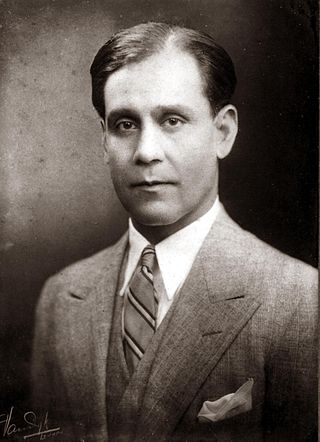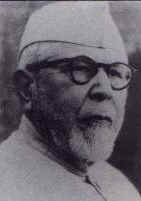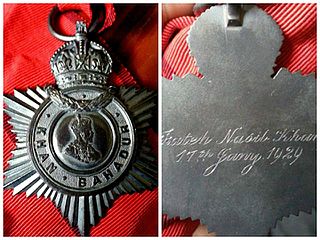Related Research Articles

Aligarh is a city in the state of Uttar Pradesh in India. It is the administrative headquarters of Aligarh district, and lies 342 kilometres (213 mi) northwest of state capital Lucknow and approximately 130 kilometres (81 mi) southeast of the capital, New Delhi. The cities and districts which adjoin Aligarh are: Gautam Buddha Nagar, Bulandshahr, Sambhal, Badaun, Kasganj, Hathras, Etah and Mathura. As of 2011, Aligarh is the 53rd most populous city in India.

Sir Syed Ahmad Khan, also spelled Sayyid Ahmad Khan, was a Muslim reformer, philosopher, and educationist in nineteenth-century British India.

SirZiauddin Ahmad was an Indian mathematician, parliamentarian, logician, natural philosopher, politician, political theorist, educationist and a scholar. He was a member of the Aligarh Movement and was a professor, principal of MAO College, first pro vice-chancellor, vice chancellor and rector of Aligarh Muslim University, India.
The All India Muhammadan Educational Conference was an organisation promoting modern, liberal education for the Muslim community in India. It was founded by Sir Syed Ahmed Khan, also the founder of the Aligarh Muslim University. All India Mumammadan Educational Conference was the origin of the All-India Muslim League. The Muslim League was born in the 20th session of All India Muhammadan Educational Conference, which was established by Syed Ahmed Khan in Aligarh in 1886. Muhammadan Educational Conference used to hold its annual meetings in various cities where, by the co-operation of local Muslims, steps were taken for the progress of education.

Hamidullah Khan was the last ruling Nawab of the princely salute state of Bhopal. He ruled from 1926 when his mother, Begum Kaikhusrau Jahan Begum, abdicated in his favor, until 1949 and held the honorific title until his death in 1960. A delegate to the Round Table Conference in London, he served as Chancellor of the Chamber of Princes from 1944 to 1947, when India became independent.
Syedna Tahir Saifuddin School, better known by its initials STS School, and by its former name Minto Circle, is a K–12 semi-residential high school under Aligarh Muslim University at Aligarh, Uttar Pradesh, India. Established by Sir Syed Ahmad Khan as Muhammadan Anglo-Oriental Collegiate School in 1875, it later evolved as Aligarh Muslim University and is one of the five senior secondary schools run by the university.

Justice Syed Mahmood was Puisne Judge of the High Court, in the North-Western Provinces of British India from 1887 to 1893, after having served in the High Court in a temporary capacity as officiating judge on four previous periods since 1882.

The Council of State was the upper house of the legislature for British India created by the Government of India Act 1919 from the old Imperial Legislative Council, implementing the Montagu–Chelmsford Reforms. The Central Legislative Assembly was the lower house.

Abdul Majeed Khwaja was an Indian lawyer, educationist, social reformer and freedom fighter from Aligarh. In 1920, he along with others founded Jamia Millia Islamia and later served its vice chancellor and chancellor.
The Aligarh Institute Gazette was the first multilingual journal of India, introduced, edited, and published in 1866 by Sir Syed Ahmed Khan which was read widely across the country. Theodore Beck later became its editor. In 1921, it was renamed the Muslim University Gazette, then later Aligarh Muslim University Gazette and AMU Gazette.
Syed Afzal Ali was a person from Bulandshahr. Four of his sons were bestowed with the title of Khan Bahadur by British India, a rare distinction in a family of Indian history.
Khan Bahadur Syed Ali Hasan was the captain of the 'MAO College Cricket Club', Superintendent of Police, Deputy Inspector General of Police and Inspector-General of Police in India. In 1930, he was knighted with the title of Khan Bahadur by British India.

General elections were held in British India between 28 October and late November 1926 to elect members of the Imperial Legislative Council and the Provincial Legislative Councils.
Raja Jai Kishan Das Chaube, CSI, Rai Bahadur was an Indian administrator and close associate of Sir Syed Ahmad Khan, founder of Aligarh Muslim University.
Maharaja Sir Mohammad Ali Mohammad Khan, Khan Bahadur, KCSI, KCIE was the Raja of Mahmudabad from 28 June 1903 to 23 March 1931 and a noted politician, zamindar of British India.
Raja Mir Syed Muhammad Baquar Ali Khan Bahadur (1842–1902) C.I.E., The Mir of Kotaha and the Raja of Morni and Pindrawal, was a noted zamindar and philanthropist from Morni who lived in Pindrawal in United Province of British India.

Aligarh Muslim University is a public central university in Aligarh, Uttar Pradesh, India, which was originally established by Sir Syed Ahmad Khan as the Muhammadan Anglo-Oriental College in 1875. Muhammadan Anglo-Oriental College became Aligarh Muslim University in 1921, following the Aligarh Muslim University Act. It has three off-campus centres in AMU Malappuram Campus (Kerala), AMU Murshidabad Centre, and Kishanganj Centre (Bihar).
The Aligarh Movement was the push to establish a modern system of Western-style scientific education for the Muslim population of British India, during the later decades of the 19th century. The movement's name derives from the fact that its core and origins lay in the city of Aligarh in Central India and, in particular, with the foundation of the Muhammadan Anglo-Oriental College in 1875. The founder of the oriental college, and the other educational institutions that developed from it, was Sir Syed Ahmed Khan. He became the leading light of the wider Aligarh Movement.

Khan Bahadur – a compound of Khan "Leader" and Bahadur "Brave" – was a honorary title in British India conferred on Indian subjects who were adherents of Islam or Zoroastrianism. The equivalent title for Hindus, Buddhists and Indian Christians was Rao Bahadur/Rai Bahadur and Sardar Bahadur for Sikhs. The title of Khan Bahadur was one degree higher than the title of Khan Sahib.
Muhammadan Anglo-Oriental College was founded in 1875 by Sir Syed Ahmad Khan, initially as a primary school, with the intention of turning it to a college level institution. It was inspired by the Cambridge education system. It started operations on Queen Victoria's 56th birthday, 24 May 1875.
References
- ↑ "Pindrawal". Archived from the original on 23 April 2012. Retrieved 14 September 2011.
- ↑ Francis Robinson (3 December 2007). Separatism Among Indian Muslims: The Politics of the United Provinces' Muslims, 1860-1923. Cambridge University Press. p. 20. ISBN 978-0-521-04826-2.
- ↑ Sir Sayyid Aḥmad K̲h̲ān̲ (1967). Selected documents from the Aligarh Archives. published for the Department of History, Aligarh Muslim University, by Asia Publishing House.
- 1 2 Thomas R. Metcalf (2002). An Imperial Vision: Indian Architecture and Britain's Raj. Oxford University Press. ISBN 978-0-19-565602-2.
- ↑ "RAJA OF KOTAHA & PINDRAWAL". Archived from the original on 28 August 2011. Retrieved 14 August 2011.
- ↑ "Raja Mir Kazim ali Khan of Pindrawal". Archived from the original on 30 March 2012. Retrieved 14 August 2011.
- ↑ Shan Muhammad (2002). Education & Politics from Sir Syed to the Present Day. APH Publishing. ISBN 978-81-7648-275-2.
Demetrius Charles Boulger (1902). Asian Review. East West.
Journal of the Royal Society of Arts. G. Bell and Sons. 1901. - ↑ Official Report of the Calcutta International Exhibition, 1883-84: Compiled Under the Orders of the Executive Committee. Bengal Secretariat Press. 1885.